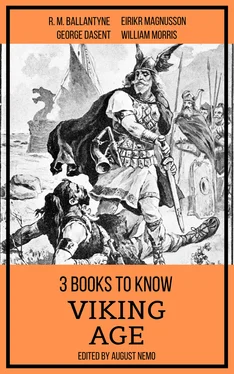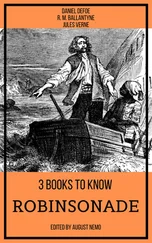“Karlsefin,” said Gudrid, stopping at the margin of the fiord, and looking pensively towards the horizon, where golden clouds and air and sea appeared to mingle harmoniously, “I wonder that you, with good ships and many stout men and plenty of means, should choose to remain in this barren spot, instead of searching out the famous Vinland and making a settlement there.”
“This barren spot is very bright to me, Gudrid; I have no desire to leave it yet a while. Since you and I were betrothed the ocean has lost its attractions. Besides, would you have me set out on a voyage of discovery at the beginning of winter.”
“Nay; but you do not even talk about going when spring comes round.”
“Because I have other things to talk of, Gudrid.”
“I fear me that you are a lazy man,” returned the widow, with a smile, “and will prove but a sorry husband. Just think,” she added, with sudden animation, “what a splendid country it must be; and what a desirable change for all of us. Thick and leafy woods like those of old Norway, instead of these rugged cliffs and snow-clad hills. Fields of waving grass and rye, instead of moss-covered rocks and sandy soil. Trees large enough to build houses and merchant-ships, instead of willow bushes that are fit for nothing except to save our poor cattle from starvation when the hay crop runs out; besides, longer sunshine in winter and more genial warmth all the year round, instead of howling winds and ice and snow. Truly I think our adopted home here has been woefully misnamed.”
“And yet I love it, Gudrid, for I find the atmosphere genial and the sunshine very bright.”
“Foolish man!” said Gudrid, with a little laugh. “And then,” she added, recurring to her theme, “there are grapes,—though, to be sure, I know not what these are, never having tasted them. Biarne says they are very good—do you think so too?”
“They are magnificent,” answered Karlsefin. “In southern lands, where Tyrker comes from, they have a process whereby they can make a drink from grapes, which maddens youth and quickens the pulse of age,—something like our own beer.”
“It does not please me to hear that,” replied Gudrid gravely; “some of our carls are too fond of beer. When old Heriulf was sick, a little of it did him good, and when Eric the Red was in his last days he seemed to gather a little strength and comfort from beer; but I never could perceive that it ever did anything to young men except make them boast, and talk nonsense, and look foolish,—or, what is worse, quarrel and fight.”
“Right, Gudrid, right,” said Karlsefin; “my opinion at least is the same as yours, whether it be right or wrong. There is some reason in applying heat to cold, but it seems to me unnecessary to add heat to warmth, artificial strength to natural vigour, and it is dangerous sometimes to add fuel to fire. I am glad you think as I think on this point, for it is well that man and wife should be agreed in matters of importance.—But to return to Vinland: I have been thinking much about it since I came here, though saying little,—for it becomes a man to be silent and circumspect in regard to unformed plans. My mind is to go thither next spring, but only on one condition.”
“And what may that be?” asked Gudrid, looking up with a little surprise, and some interest.
“That you shall go with me, Gudrid; for which end it will be needful that you and I should wed this winter.”
Gudrid could not help blushing a little and looking down, for Karlsefin, despite his suavity, had a way with him, when thoroughly in earnest, that was very impressive. She did not hesitate, however, but answered with straightforward candour, “I will not say nay to that if my brother Leif is willing.”
“It is settled then,” replied Karlsefin decisively, “for Leif has already told me that he is willing if you are, and so—”
At this interesting point in the conversation they were interrupted by a loud merry laugh not very far from them, and next moment little Olaf, starting out from behind a bush, ran shouting into Gudrid’s extended arms. “Oh, what do you think?” he exclaimed, “aunt Freydissa has come over from Heriulfness, and is in such a rage because Biarne has told her that Thorward has been making love to his cousin Astrid, and—”
“Hush, boy,” said Gudrid, covering his mouth with her hand, “you should not talk so of your aunt. Besides, you know that it is an evil thing to get the name of a tale-bearer.”
“I did not think it was tale-bearing,” replied the lad, somewhat abashed, “for it is no secret. Leif was there, and Astrid herself, and all the house-carls in the hall must have heard her, for she spoke very loud. And oh! you should have seen her give Thorward the cold shoulder when he came in!”
“Well, well, Olaf, hold your noisy tongue,” said Gudrid, laughing, “and come, tell me how would you like to go to Vinland?”
“Like to go to Vinland!” echoed the boy, turning an ardent gaze full on Karlsefin, “are you going there, sir? Will you take me?”
Karlsefin laughed, and said, “You are too quick in jumping to conclusions, child. Perhaps I may go there; but you have not yet answered Gudrid’s question—would you like to go?”
“I would like it well,” replied Olaf, with a bright look of hopeful expectation that said far more than words could have expressed.
Just then Thorward was seen approaching along the beach. His brows were knit, his lips pursed, and his eyes fixed on the ground. He was so engrossed with his thoughts that he did not perceive his friends.
“Here he comes,” said Karlsefin—“in the blues evidently, for he does not see us.”
“We had better leave you to his company,” said Gudrid, laughing; “a man i’ the blues is no pleasure to a woman.—Come, Olaf, you and I shall to the dairy and see how the cattle fare.”
Olaf’s capacity for imbibing milk and cream being unlimited, he gladly accepted this invitation, and followed his aunt, while Karlsefin advanced to meet his friend.
“How now, Thorward, methinks an evil spirit doth possess thee!”
“An evil spirit!” echoed Thorward, with a wrathful look; “nay, a legion of evil spirits possess me! A plague on that fellow Biarne: he has poisoned the ears of Freydissa with lies about that girl Astrid, to whom I have never whispered a sweet word since we landed.”
“I trust you have not whispered sour words to her,” said Karlsefin, smiling.
“And Freydissa, forsooth, gives me the cold shoulder,” continued the exasperated Norseman, not noticing the interruption, “as if I were proved guilty by the mere assertion.”
“It is my advice to you, Thorward, that you return the compliment, and give the cold shoulder to Freydissa. The woman has a shrewish temper; she is a very vixen, and will lead you the life of a dog if you marry her.”
“I had rather,” said Thorward between his teeth, and stamping, “live a dog’s life with Freydissa than live the life of a king without her!”
Karlsefin laughed at this, and Thorward, taking offence, said fierily, and with some scorn—“Thinkest thou that because thy Gudrid is so smooth-tongued she is an angel?”
“That is what I am inclined to think,” answered Karlsefin, with a smile that still further exasperated his friend.
“Perchance you may find yourself mistaken,” said Thorward. “Since you are so free with your warnings, let me remind you that although the course of your courtship runs smooth, there is an old proverb—descended from Odin himself, I believe—which assures us that true love never did so run.”
“Then I recall my words, Thorward, and congratulate you on your true love—for assuredly your courtship runs in an uncommonly rugged course.”
Читать дальше












